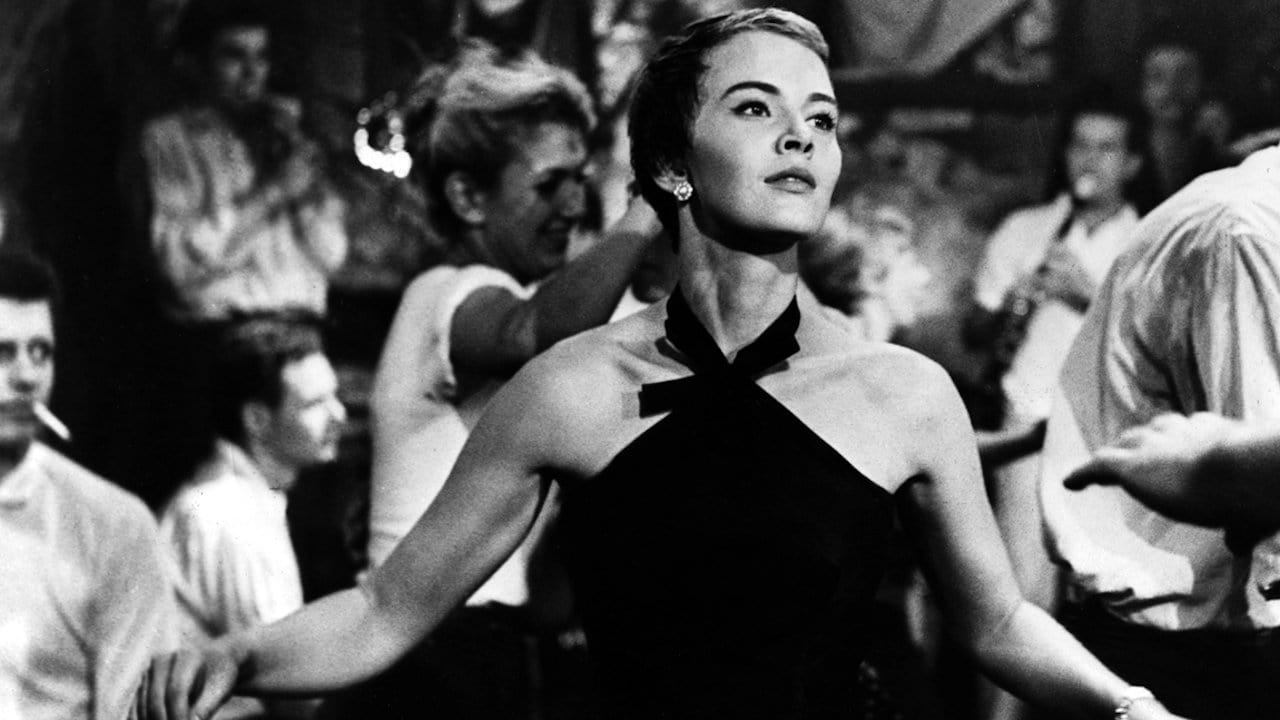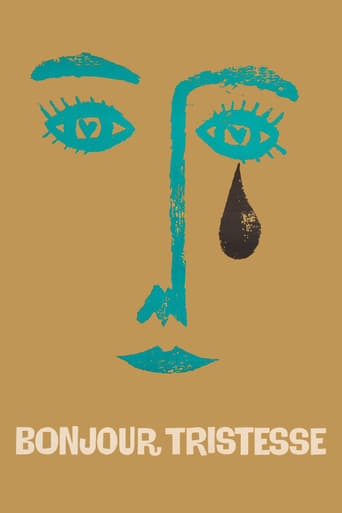TrueJoshNight
Truly Dreadful Film
GetPapa
Far from Perfect, Far from Terrible
Leoni Haney
Yes, absolutely, there is fun to be had, as well as many, many things to go boom, all amid an atmospheric urban jungle.
Kaelan Mccaffrey
Like the great film, it's made with a great deal of visible affection both in front of and behind the camera.
preppy-3
**SPOILERS THROUGHOUT** Cecile (Jean Seberg) is a rich spoiled college girl who is far too attached to her loving father Raymond (David Niven)--her mother has passed away. An old friend named Anne (Deborah Kerr) visits them while they're on vacation in France and falls in love with Raymond. Cecile feels threatened and will do anything to stop the love affair. This all leads to tragedy.I never read the book this was based on so I can't compare but, on its own level, this is a strange but beautiful soap opera. I originally saw a brand new print of this ages ago in an art house and the colors and beautiful scenery came roaring off the screen. I vaguely remembering liking it...but being confused. Seeing it again I can see why. The film acts like it's making some big important message...but it's not. It's well made and all but nothing here stands out. The only element that was surprising is that it makes it clear that Cecile and Philippe (Geoffrey Horne) are having sex...but she is punished for it (in a way) at the end. This was just director Otto Preminger's second attempt to make Seberg a movie star. It's not a total washout--it's too bizarre to just completely dismiss. I do like the way it shows the present (actually 1958) in black & white and the scenes one year before in bright color. However the reason for the juxtaposition is pretty obvious. The acting varies. Kerr is excellent in her role and Niven is just OK in his. Horne is pretty affecting too but he's not given enough to do. Unfortunately Seberg is terrible in her role. Except for the ending she always has this blank look on her face and it's impossible to get a grip on her character. There's also some hysterically bad dialogue. So it's not a washout but no big deal either. For Kerr, the color and scenery alone I give it an 8.
bkoganbing
The trio of David Niven, Deborah Kerr, and Jean Seberg star in Otto Preminger's Oedipal drama Bonjour Tristesse. With those Givenchy gowns featured, how did Audrey Hepburn miss this film?Based on the Francoise Sagan novel, this is one strange tale of a playboy father, the daughter who adores him and the woman who threatens to come between them. Niven is the playboy who must have inherited his wealth because he doesn't look like he worked a day in his life. At one time he was married and had Seberg with his late wife. Anyway she travels with him and enjoys life and its vices the same way he does.It's all right when Niven's fooling around with Mylene Demongeot, the latest in a string of flings, but when old flame Deborah Kerr shows up and wants to marry Niven, that puts Seberg off.Truth be told Kerr had no right acting like a stepmother before the wedding. Still it didn't justify what Seberg set in motion that ends in tragedy.The novel is French based of course and I think the French should have filmed it. I think Otto Preminger was just the wrong director for this kind of material. Geoffrey Horne plays Seberg's boyfriend and Martita Hunt is his mother round out a stylish cast. But with only one actual person of French nationality among the main cast. that was a big mistake.
robert-temple-1
The wonderfully fresh and vivacious Jean Seberg here shines in her second film. The previous year she had played Joan of Arc (chosen from 18,000 young girls who auditioned for the role), and here Otto Preminger directs his protégé again to superb effect. The film opens with very dramatic music by Georges Auric. This film is based upon the best-selling first novel by the young Francoise Sagan, which created a scandal then but now is not scandalous at all. What passed for 'decadence' at the time was a life of aimless idling by the rich on the Riviera, some gambling, some boating, some swimming, some affairs, and a great deal of insipid self-indulgence. This we see epitomised in Seberg's father, played to perfection by David Niven, a shallow idler and womanizer who straightens his bow tie self-consciously between seductions in the bushes. He and Jean have a 'father-and-daughter-thing' because her mother died long ago, and they really don't want anybody else in their lives apart from casual partners with whom they can romp, only to throw them away when used, joking about them to each other as they get ready to have an evening out. As the film opens, Niven's girlfriend of the moment is Elsa, a charmingly empty-headed creature played delightfully by Mylene Demongeot, who shows such talent as a restrained comedienne. Juliette Greco makes a full-throated appearance in a club, singing the film's theme song all the way through as the dancing and whirling Jean stares at her glassy-eyed over men's shoulders, lost in haunted visions of regret. In 1958, the teenage girls of Britain all swooned over and identified with Jean Seberg, who seems to have originated the shorn boyish haircut which Mia Farrow later copied. Niven as the amiable cad was pretty much what one would expect. But into this mix comes Miss Straight, in the form of Deborah Kerr, who says to Niven when he gets flirty: 'I don't want to be casual.' That's for sure. When Niven finally decides he wants to marry her, she becomes a Little Hitler in no time, bossing Jean around, stopping everyone having 'fun', and generally making herself odious with her control-freakery. This leads to a campaign to drive her out by Jean and Elsa, who has been unceremoniously dumped. Meanwhile, Kerr has fallen hard, and in a revealing shot in the harsh sun we even discover that her true complexion was rather gingery and freckly, something concealed in her other films. Tragedy is not long in coming, hence the 'tristesse'. This is a social document of the 1950s which people interested in knowing what things were once like should watch. The film is directed by a master, Preminger, and Jean Seberg 'makes it' entirely. She is so refreshing, natural, young, real. Poor Jean Seberg. By the age of 40 she was dead. But she left much to remember her by: no one who has seen 'Breathless' (1960) can ever forget her. This film too keeps her wonderful memory alive. Her best acting performance was probably in 'Lilith', but she does well enough here, wholly dominating the screen and acting circles round the old pros. Oh yes, and then there's the inside joke about Eveline Eyfel playing three identical sisters who act as the maid, which is an amusing touch. The Mediterranean sparkles in the sunshine, the pine trees along the beach are exuding their aroma, swim suits dry in minutes: come on in, the water's fine!
rsternesq
This is an odd movie based on a rather simple and not very odd book. First of all, making the father/fiancé so very British is odd in a French context. Even more peculiarly, the actor with the least ability and an American to boot, was the only one of the main trio who seemed French and indeed managed to make herself French during her short life. That said, it is worth the time, is interesting and, of course worth talking and writing about. However, if is not a great movie, not even a good one. Coulda, Shoulda, Woulda resound in my head as the inevitable unfolds. In any event Ms. Kerr is always well worth watching and Mr. Niven is no slouch either. He does manage to convey that he knows he has blighted his life and no, he wasn't a dirty old man. He was a man in his prime with no purpose and is keenly aware that he is marking time. As to the inference of incest, the matching tied shirts, the interest in each other's comings and goings all heightens a sense of unhealthy over-investment. However without that sense of over-investment in daughter by father and in father by daughter, one would have no plot, n'est pas?

